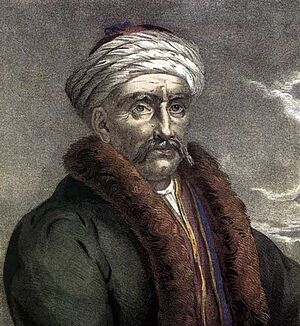Panoutsos Notaras facts for kids
Panoutsos Notaras (born March 31, 1740 or 1752 – died January 18, 1849) was a Greek hero and politician. He played a very important role in the Greek War of Independence. He often served as the leader of Greek national meetings and law-making groups.
Contents
Early Life and Family
Panoutsos Notaras was born in Trikala, Corinthia, Greece. His exact birth year is either 1740 or 1752. His family, the Notarades, was one of the six most powerful Greek families in the Peloponnese region. This was during the time when the Ottoman Turks ruled Greece. His family members held important jobs in the local government. Panoutsos' father, Spyridon Notaras, was known as a very educated Greek leader. Panoutsos himself received a good education from a teacher named Grigorios Karvounis. However, he was not very strong or healthy, so he could not go to university in Italy.
Fighting for Greek Freedom
Panoutsos Notaras first took part in a failed uprising called the Orlov Revolt in 1770. Later, in 1818, he joined a secret group called the Filiki Etaireia. This group was secretly planning another Greek rebellion against the Ottoman Empire.
Starting the War of Independence
When the Greek War of Independence began in March 1821, Panoutsos first thought it was too soon. He even disagreed with Papaflessas, a messenger from the Etaireia, about this. However, as the rebellion grew, he changed his mind. His brother Andrikos was killed by the Ottomans in April. Then, Dimitrios Ypsilantis arrived in the Peloponnese in June. After these events, Panoutsos fully supported the fight for freedom.
Roles in the New Government
Panoutsos Notaras was chosen as a representative for the First National Assembly at Epidaurus in late 1821. He was part of a 12-person group that wrote the first Greek Constitution of 1822. In the first temporary government, called the Executive of 1822, he was the Minister of Economy. He held this job from January 1822 to April 1823.
From October 1824 to April 1826, Notaras was the President of the Legislative Corps. This group was in charge of making laws. During the Greek civil wars of 1824–1825, he supported the "government" side. Even so, he tried to help the two sides make peace. He asked the government to be kind and forgive their opponents.
Later Political Positions
Notaras briefly served as President of the Third National Assembly at Troezen in April 1826. But the meetings stopped when news came that Missolonghi had fallen to the Ottomans. He continued to lead a temporary group that represented the Assembly to the government. In March 1827, he ordered the Assembly to meet again in Troezen. However, he was removed from his job before the Assembly met again. This was due to a problem involving his nephew, Ioannis Notaras. Panoutsos then stayed out of public life for two years.
When Ioannis Kapodistrias became the new Governor of Greece, Notaras joined the Panellinion. This was a group that advised the governor instead of a parliament. But Notaras was not very active in this group. In November 1829, Kapodistrias made Notaras the president of the Court of Appeals in Nafplion.
Notaras also took part in the Fifth National Assembly at Nafplion. After Ioannis Kapodistrias' brother, Augustinos Kapodistrias, resigned, Notaras supported Ioannis Kolettis. He was chosen as President of the Assembly in June 1832. He led it until it ended in August. During his time as president, the Assembly accepted Prince Otto of Bavaria as the new King of Greece. Otto was chosen by three powerful countries: France, Britain, and Russia.
Later Life and Passing
Panoutsos Notaras did not play a big role in politics during the first ten years of King Otto's rule. But after the 3 September 1843 Revolution, he was chosen as President of a new National Assembly. This Assembly was given the job of writing a new constitution. He held this position from November 1843 to March 1844. This was mostly an honorary role because of his old age. He was called the "Nestor of Greek politicians," meaning he was a wise old leader. The actual work was done by the Assembly's vice-presidents.
In 1846, Notaras wrote his life story. He then moved back to his hometown of Trikala. He died there on January 18, 1849. The historic Notarades building still stands in the village.
 | Chris Smalls |
 | Fred Hampton |
 | Ralph Abernathy |


